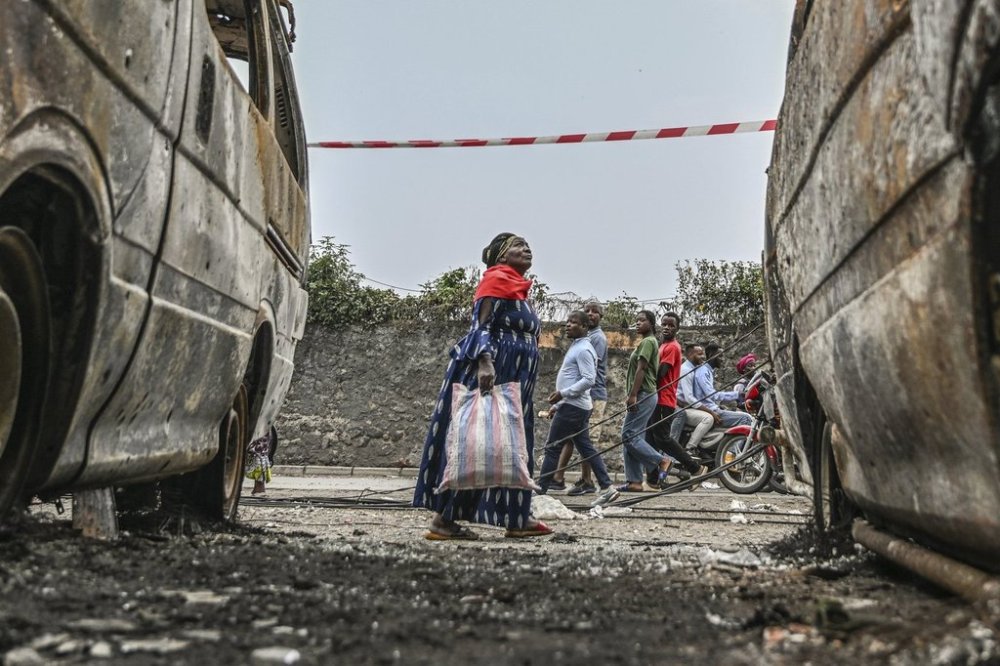UN rights body condemns Rwanda and the rebels it backs in neighboring Congo. Violence mounts in east
Advertisement
Read this article for free:
or
Already have an account? Log in here »
To continue reading, please subscribe:
Monthly Digital Subscription
$0 for the first 4 weeks*
- Enjoy unlimited reading on winnipegfreepress.com
- Read the E-Edition, our digital replica newspaper
- Access News Break, our award-winning app
- Play interactive puzzles
*No charge for 4 weeks then price increases to the regular rate of $19.00 plus GST every four weeks. Offer available to new and qualified returning subscribers only. Cancel any time.
Monthly Digital Subscription
$4.75/week*
- Enjoy unlimited reading on winnipegfreepress.com
- Read the E-Edition, our digital replica newspaper
- Access News Break, our award-winning app
- Play interactive puzzles
*Billed as $19 plus GST every four weeks. Cancel any time.
To continue reading, please subscribe:
Add Free Press access to your Brandon Sun subscription for only an additional
$1 for the first 4 weeks*
*Your next subscription payment will increase by $1.00 and you will be charged $16.99 plus GST for four weeks. After four weeks, your payment will increase to $23.99 plus GST every four weeks.
Read unlimited articles for free today:
or
Already have an account? Log in here »
Hey there, time traveller!
This article was published 07/02/2025 (291 days ago), so information in it may no longer be current.
GENEVA (AP) — The U.N.’s top human rights body on Friday condemned Rwanda’s support of rebel fighters across the border in eastern Congo and ordered a team of experts to examine rights violations in the region.
The decision by the Human Rights Council was requested by Congo and agreed to by consensus, meaning no vote was taken. It culminated an urgent session on the spiraling violence in a region where Rwanda-backed M23 rebels recently captured the key city of Goma. Some 3,000 people have been killed and nearly as many injured since late January.
The area holds vast deposits of minerals critical to the manufacture of much of the world’s technology, including mobile phones.

The resolution text, among other things, “firmly condemns the military and logistic support of the Rwandan defense force to the March 23 Movement, which continues to cause many civilian casualties, more displacement and significant trauma among the population.”
The council also called on the M23 and Rwandan defense forces “to immediately halt violations of human rights” in the North and South Kivu regions, and allow access to humanitarian aid deliveries through the airport in Goma.
It also decided to create an independent commission of inquiry made up of three experts in international law to look into rights violations and report back to the council.
U.N. experts say the rebels, the most potent of more than 100 armed groups in the region, are backed by roughly 4,000 troops from neighboring Rwanda. U.N. Secretary-General António Guterres has urged the rebels to lay down their weapons and agree to mediation.
Volker Türk, the U.N. human rights chief, said an estimated 3,000 people were killed and nearly 2,900 wounded in an increase in violence since Jan. 26. Speaking as the special session began, he cautioned that the real figures are “probably a lot higher.”
“If nothing is done, then the worst could still be yet to come for the inhabitants of the eastern part of the country, but also in people living beyond the DRC’s borders,” he said, referring to the Democratic Republic of Congo.
Türk noted attacks by M23 and their allies, the use of heavy weaponry, and intense fighting with Congo’s armed forces and their allies.
“The Congolese people have been suffering terribly for decades,” he said, calling for international action. “How many more innocent lives must be lost before sufficient political will is galvanized to resolve this crisis?”
The rebels sought to reassure residents Thursday, holding a stadium rally and promising safety under their administration as they try to shore up public support amid growing international pressure.
Patrick Muyaya Katembwe, Congo’s communications minister, called on the council to “hold Rwanda responsible for its war crimes and crimes against humanity” through allegedly forced displacement and an aim “to definitively occupy these territories.”
Ambassador James Ngango, Rwanda’s permanent representative to U.N. institutions in Geneva, said members of an armed group that participated in the Rwanda genocide in 1994 had fled to Congo, “where they now pose an existential threat to our security” and were spreading “their genocidal ideology.”

